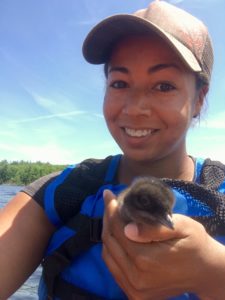Ericka Griggs – MS Biology
NSF Research Fellowship awarded to WCSU graduate student
Griggs’ work and research in the field of biodiversity earns a fellowship award from the National Science Foundation
DANBURY, Connecticut — Ericka Griggs, a graduate student at Western Connecticut State University, has been awarded the prestigious National Science Foundation Graduate Research Fellowship for her thesis proposal and work on loon biology and conservation. Griggs is entering her second year pursuing a master’s degree in Integrative Biological Diversity at WCSU.
Ericka Griggs holding a young loon.
Griggs, a resident of Hamden, works seasonally in Massachusetts as a common loon biologist with the Biodiversity Research Institute (BRI), located in Portland, Maine. With the BRI, Griggs aids in the effort to relocate common loons to Massachusetts after more than 100 years of relative absence from the area. Hunting, pollution and deforestation during the 18th and 19th centuries decimated the loon population of Massachusetts, although populations still live in New Hampshire, Maine and Canada.
Scientists discovered the first new breeding pair of common loons in Massachusetts in 1975, indicating that the New Hampshire common loon population had begun to expand. Since then, groups like those at the BRI have been working to facilitate this expansion in order to promote biodiversity in New England ecosystems. A substantial oil spill in 2003 only served to intensify ecological efforts, after a large portion of the financial settlement was devoted to aiding loon resettlement.
Griggs noted in her thesis proposal, for which she received the NSF fellowship, that the influx of loons in lower New England will be presented with a landscape that is vastly different from the one they left 100 years ago. First, Griggs cited basic human disturbance as a main difference, being heavily linked to common loons’ abandonment of their nests. She also mentioned the increased volume of heavy metals in the waters of Massachusetts as potentially life-threatening for future and current generations of loons.
Griggs has already addressed both of these problems. In a recent address to the Taunton River Watershed Alliance in Massachusetts, she stated that “sharing the lake with loons means people are going to have to change some of their practices. People are used to, if you drive a boat near a duck, it will fly away. But a loon won’t because it’s protecting its chick.”
Her thesis proposal, “An evaluation of blood heat shock proteins as biomarkers of stress in common loons,” goes into depth on these factors and the potential dangers to loons. In the specific case of toxic metal accumulation, she asserts that the high content of metals like Mercury “can trigger a specific cellular response known as the heat shock response (HSR).” Griggs’ thesis project aims to study HSR in a sample of common loons in New England to better understand the possible long-term biological implications of their new habitat.
Griggs plans to complete the project in the next 13 months. During May through September 2021, Griggs will complete fieldwork studying and collecting biological samples from loons in lower New England. She will then complete lab work through January 2022, which will be analyzed until the end of February. That spring, she will write and defend her thesis.
After submitting her proposal for review to the National Science Foundation, she was selected as a recipient of a graduate research fellowship. The fellowship itself is a five-year program, “providing three years of financial support including an annual stipend of $34,000 and a cost of education allowance of $12,000 to the institution.” Griggs states that her goal for the fellowship is to complete her master’s degree over the next year, then to “pursue a Ph.D. in wildlife endocrinology studying stress in organisms that are having to adapt quickly to a changing climate due to climate change.”
WCSU’s M.S. in Integrative Biological Diversity was introduced by the university’s Department of Biological and Environmental Sciences as a way to address interest in ecological preservation. Graduate students in this program study both the scientific and societal implications of biodiversity, in preparation for professional development in the field. Dr. Michelle Monette, Griggs’ mentor in the M.S. program, stated that she “prevailed among 12,000 other applicants for this NSF fellowship, most of whom were Ph.D. students.”
When speaking on her achievement, Griggs emphasized the impact of her resources and mentors at WCSU. “The mentors were the reason I was able to have a successful NSF proposal,” she said. “I worked closely with my adviser Dr. Michelle Monette. This program has provided an opportunity for an older student like me, who has had no research experience, to learn how to become a scientist. I came into the program with the field experience, but Dr. Monette is teaching me skills that can only be learned through hands-on lab experience.”
In a statement congratulating Griggs on her fellowship, WCSU Biology Chair Dr. Theodora Pinou made it a point to “recognize the importance of the excellent mentorship by Monette and Griggs’s external partner, Lucas Savoy of the Biodiversity Institute in Massachusetts, and all their support in helping Ericka achieve this honor,” adding that it is “a testament to the research and mentorship that is possible here at WCSU.”